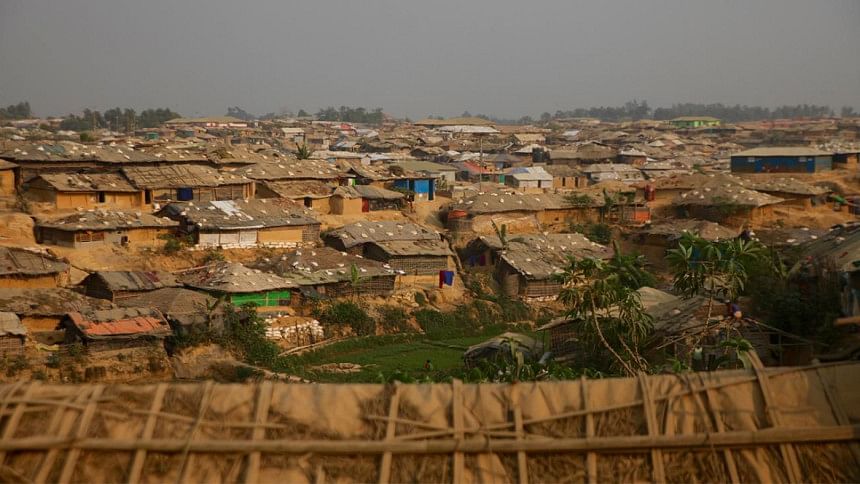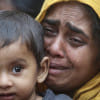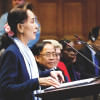INGOs Spending on Rohingyas: Operations eating up a thick slice

A large portion of the donations meant for the displaced Rohingyas in Bangladesh is being spent as operational cost of international NGOs, says a study.
In some cases, the study found the operational cost of the international non-government organisations (INGO) in Cox's Bazar was five times higher than the programme requirement, a problem compounded by a lack of transparency in INGOs' operational cost expenditure.
Coastal Association for Social Transformation Trust (COAST) unveiled the study at a round table discussion at CIRDAP conference room in Dhaka.
COAST organised the discussion in association with OXFAM.
The study was prepared using survey results based on the responses of 42 local NGOs and 19 INGOs or UN agencies.
At the roundtable, speakers urged the stakeholders to ensure that funding comes directly to local NGOS as opposed to being disbursed by international ones. This will reduce the transactional cost in the humanitarian response as per the Grand Bargain (GB) commitment signed in 2016 by the UN agencies.
Mujibul Haque Munir, assistant director (education and food security) of COAST, presented the keynote paper in presence of high-ups from the government, INGOs and UN agencies.
"Around 3,000 registered and non-registered foreigners are working under INGOs in Cox's Bazar. More or less, every foreign aid worker receives approximate Tk 25 thousand as daily allowance, excluding their regular salary, which is collectively taka two crore daily. This is also five times higher than the operational cost of the local NGOs," Munir told The Daily Star.
The survey presented a case study of an INGO which had been working in Cox's Bazar for the last one year with three to four staffers.
Based on one calculation, that certain INGO spent 18 percent for the programme while 82 percent was spent for operations.
The total funding for the INGO was Tk 5.55 crore, a source requesting anonymity told The Daily Star, adding "the case is almost similar to that of most INGOs there".
Beginning from January of this year, donors revived some USD $682 million, equivalent to some $3,284 per Rohingya family, while 75 percent projects of INGOs or UN agencies were being implemented through local or national NGOs, the study added.
The INGOs are also spending a huge amount on transportation.
As mentioned in the report, the daily movement of some 545-575 cars from Cox's Bazar to Rohingya camps had not only increased expenditures, but also "forced local kids and children to stop going to schools".
To reduce operational costs, the INGOs have committed to the Charter 4 Change (C4C) -- an initiative that aims to transform the way the humanitarian system operates to enable national actors to play an increased and more prominent role in humanitarian response -- to implement changes to the way the humanitarian systems operate to enable more locally-led response.
Besides, the UN agencies and INGOs signed the GB commitments for aid transparency and are continuously trying out ways to reduce transaction cost by working through local NGOs and local government agencies.
However, the INGOs aren't following both C4C and GB while, in some cases, the INGOs don't disburse the entire fund to the local NGOs, according to the NGO.
Nahida Sobhan, director general on UN in the Ministry of Foreign Affairs, during her address said, "Sustainable, safe and voluntary repatriation is the goal of the government. There is a greater need for coordination in humanitarian response, including the local NGOs [who need] to address this need."
KM Abdus Salam, director general of NGO Affairs Bureau, questioned the authenticity of the survey while also praising the attempt by COAST.
He said, "This should be in a very professional, friendly manner and in a coordinate way; not in a negative approach and not to hurt the opponent. I humbly request all to make and create a very congenial and conducive relation between international and national NGOs to face such types of internal crisis."
The local and national NGOs have the expertise and capacity to conduct operations for the Rohingya response, he also said.
He urged all NGOs "not to go beyond the humanitarian support" by not going against the government's decision about repatriation.
Mia Seppo, UN resident coordinator said, "We have to be respectful to everybody involved in the response. Our footprint in development should be more humble and cooperative."
Papa Kysma Sylla, country representative of UNHCR, said, "We have to work with the Myanmar government to improve the situation so that the refugees can go back to their country."
AKM Musha, country director of Concern Worldwid, said that everyone was committed to the GB, particularly on the question of localisation.
"Donors are the big factor in this regard, not the INGO or UN agencies. We need to discuss on the practical arrangement on how we can engage them," said Musha.
Chaired by Abdul Karim, ex-principal secretary to the government and managing director of PKSF, Anita Kattakuzhy of Oxfam International, Abu Morshed Chowdhury of Cox's Bazar CSO NGO Forum (CCNF) addressed the discussion among others.

 For all latest news, follow The Daily Star's Google News channel.
For all latest news, follow The Daily Star's Google News channel. 








Comments